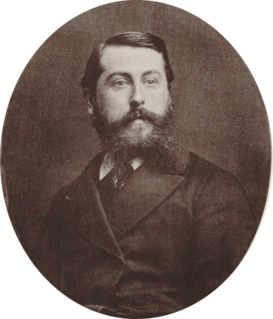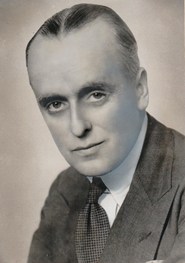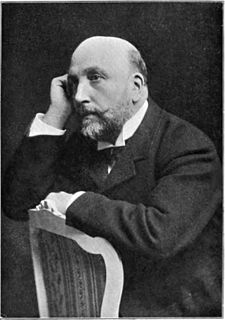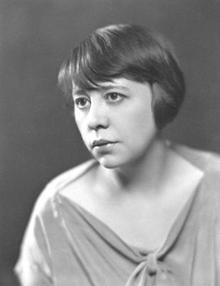Related Research Articles

Sir Arthur Seymour Sullivan MVO was an English composer. He is best known for 14 operatic collaborations with the dramatist W. S. Gilbert, including H.M.S. Pinafore, The Pirates of Penzance and The Mikado. His works include 24 operas, 11 major orchestral works, ten choral works and oratorios, two ballets, incidental music to several plays, and numerous church pieces, songs, and piano and chamber pieces. His hymns and songs include "Onward, Christian Soldiers" and "The Lost Chord".

Richard Georg Strauss was a German composer, conductor, pianist, and violinist. Considered a leading composer of the late Romantic and early modern eras, he has been described as a successor of Richard Wagner and Franz Liszt. Along with Gustav Mahler, he represents the late flowering of German Romanticism after Wagner, in which pioneering subtleties of orchestration are combined with an advanced harmonic style.

Paul Abraham Dukas was a French composer, critic, scholar and teacher. A studious man, of retiring personality, he was intensely self-critical, and he abandoned and destroyed many of his compositions. His best known work is the orchestral piece The Sorcerer's Apprentice, the fame of which has eclipsed that of his other surviving works. Among these are the opera Ariane et Barbe-bleue, his Symphony in C and Piano Sonata in E-flat minor, the Variations, Interlude and Finale on a Theme by Rameau, and a ballet, La Péri.

Clément Philibert Léo Delibes was a French composer, best known for his ballets and operas. His works include the ballets Coppélia (1870) and Sylvia (1876) and the opera Lakmé (1883).
This article presents lists of the literary events and publications in 1830.
This article presents lists of the literary events and publications in 1787.

Sir Edward German was an English musician and composer of Welsh descent, best remembered for his extensive output of incidental music for the stage and as a successor to Arthur Sullivan in the field of English comic opera. Some of his light operas, especially Merrie England, are still performed.

Amédée-Ernest Chausson was a French Romantic composer who died just as his career was beginning to flourish.

Eric Francis Harrison Coates was an English composer of light music and, early in his career, a leading violist.

Sir Alexander Campbell Mackenzie KCVO was a Scottish composer, conductor and teacher best known for his oratorios, violin and piano pieces, Scottish folk music and works for the stage.

Zoe Byrd Akins was an American playwright, poet, and author. She won a Pulitzer Prize for drama.

Jan Wiktor Kiepura was a Polish singer (tenor) and actor.

Alessandro, is an opera composed by George Frideric Handel in 1726 for the Royal Academy of Music. Paolo Rolli's libretto is based on the story of Ortensio Mauro's La superbia d'Alessandro. This was the first time the famous singers Faustina Bordoni and Francesca Cuzzoni appeared together in one of Handel's operas. The original cast also included Francesco Bernardi who was known as Senesino.

Ben Davies was a Welsh tenor singer, who appeared in opera with the Carl Rosa Opera Company, in operetta and light opera, and on the concert and oratorio platform. He was spoken of as a successor of Edward Lloyd, as a leading British tenor, and retained something of his style and repertoire in concert performance.

Edward Lloyd was a British tenor singer who excelled in concert and oratorio performance, and was recognised as a legitimate successor of John Sims Reeves as the foremost tenor exponent of that genre during the last quarter of the nineteenth century.

Marie Brema was a British dramatic mezzo-soprano singer in concert, operatic and oratorio work in the last decade of the 19th and the first decade of the 20th centuries. She created several important roles and was the first British singer to appear at the Bayreuth Festspielhaus.

Frederic William Austin was an English baritone singer, a musical teacher and composer in the period 1905–30. He is best remembered for his restoration and production of The Beggar's Opera by John Gay and Johann Christoph Pepusch, and its sequel, Polly, in 1920–23. Austin was the older brother of the composer Ernest Austin (1874–1947).

Le Roi Carotte is a 4-act opéra-bouffe-féerie with music by Jacques Offenbach and libretto by Victorien Sardou, after E. T. A. Hoffmann. The libretto, written before the French defeat in the Franco-Prussian War, lampooned Bonapartists, monarchists and republicans. Staging the piece required elaborate costumes and grand spectacle, including a wide range of locations and numerous scene changes.

Liza Lehmann was an English operatic soprano and composer, known for her vocal compositions.

La Béarnaise is an opéra comique in three acts of 1885, with music by André Messager and a French libretto by Eugène Leterrier and Albert Vanloo.
References
- Hulme, David Russell (2001). "German, Edward". In Sadie, Stanley; Tyrrell, John (eds.). The New Grove Dictionary of Music and Musicians . ? (2nd ed.). London: Macmillan. pp. 703–705.
- Scott, William Herbert (1932). Edward German: An Intimate Biography. London: Cecil Palmer.
- Rees, Brian (1986). A Musical Peacemaker: The Life and Work of Sir Edward German. Abbotsbrook: Kensal Press.